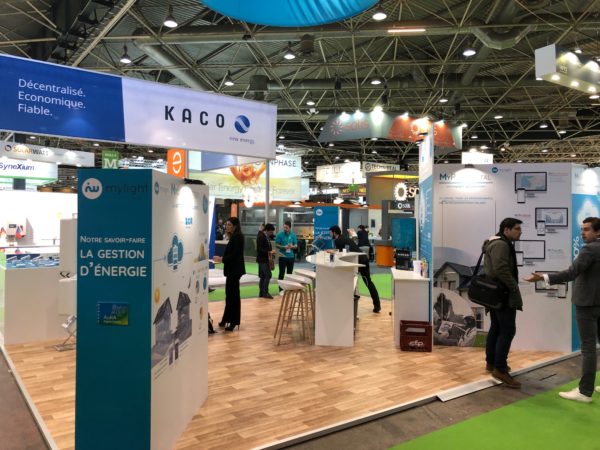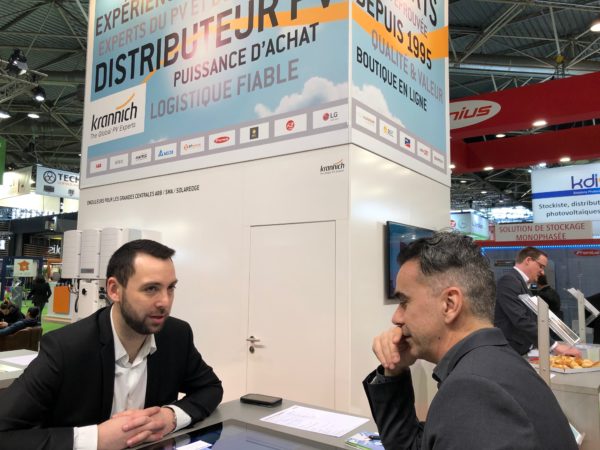Release Time:2019-02-19
The solar event in Lyon illustrated how expectations of French solar remain big despite lower-than-expected development and issues related to regulations and carbon footprint requirements. The large participation of international and Chinese players seeking business among installers and distributors is a signal things may improve in the short term, and larger volumes may be deployed in the coming years.

BePositive was held in Lyon, one of France’s solar energy hotbeds.
Image: pv magazine
France is still significantly below its potential in terms of solar energy development, as recent statistics from thinktank France Territoire Solaire showed. According to those numbers, the country was still a sub-gigawatt market last year, with only 850 MW or so of capacity deployed – more or less the same volume seen in 2017.
Despite that lower-than-expected development, however, expectations for French solar remain quite high, as the BePositive 2019 fair proved last week. Held in Lyon – a hub of the French solar ecosystem together with Montpellier and Paris – the show saw participation by French solar and energy companies including Photowatt, EDF, Engie, Reden Solar and Recom-Sillia and also hosted the stands of international PV product providers, including Asian panel makers such as Jinko, JA Solar, Longi, Hanwha Q-Cells, ZNShine Solar, VSUN and Talesun, and Chinese inverter suppliers Growatt and Sungrow. Among the European inverter manufacturers and providers were also Germany’s SMA, Kaco, SolarWatt, Tesvolt, Austria’s Fronius and Switzerland’s St?ubli.
The pull for the international players was explained by Jinko sales manager for France and Benelux, Florent Sayet, who told pv magazine in a statement, the market is expected to see stronger growth from this year. “Our forecasts for the French market for the next two or three years are quite optimistic,” he said. “There are forecasts predicting between 1.2 GW and 1.3 GW of new solar capacity for this year, as a result of the series of tenders implemented by the French government, but my feeling is that we could also see around 1 GW or a bit less.
“With the French market, however, we should never believe in too optimistic announcements, as recent figures for new deployment showed. There is willingness to reach higher goals on the one side, from the French government, but there is also the reality of strict and difficult rules.”
Sayet said French tenders for utility-scale solar – around 70% of the market – are not well designed, with around 30% of the selected projects never reaching completion. “I think that we are still more optimistic than what we have to be,” he said, albeit reiterating Jinko’s commitment to French PV.

According to Eric Magistrello, country manager for France at Chinese inverter manufacturer Sungrow, the BePositive event reflected the growth of solar in France.
“We didn’t expect to see so many people here, and we will come for sure in two years,” he told pv magazine. “I believe that the French solar market may reach an annual growth of 2 GW in two or three years. The company is currently operating mainly in the large-scale segment, providing its central solutions. But we will launch a solution for the C&I [commercial and industrial] segment in France quite soon.”
Kui Li, Vice President of Suntech Deutschland GmbH, the German unit of Chinese module provider Suntech, said the company decided to return to BePositive after seven years. “We are in France since 18 years, and we now want to further increase our presence here,” she said. “We have already, strong distribution channels here, and we also consider France as a good platform for making good business in other solar markets.” As an example, Zhou cited a recent contract the company secured from a French renewables developer for 200 MW of solar in Egypt. “We are also in talks with big players such as Engie and EDF,” she added.
JA Solar’s Effy Zhang was equally upbeat. “We were also here in 2017 but this year we see that all Tier 1 [companies] are here,” the company’s marketing manager for Europe told pv magazine. “I see the French market, definitely, in the next two years coming, but I also hope that France can be more open regarding carbon footprints,” she added, calling for flexibility over a regulation which applies a 15% evaluation premium on projects featuring PV modules with low carbon footprints in tenders for large-scale solar.
That rule was highlighted as one of the main obstacles to development in France’s utility-scale segment by many companies at the fair.
Chinese monocrystalline module maker Longi is also betting on French solar. “This is our first trade show in France,” sales director for the EMEA region Nick Wang told pv magazine. “The event is very interesting and we will be here again in two years, as we have met several potential customers. We see a lot of potential in this market for the next five years, I think that also other competitors are moving here now.”
Big companies move in
“From our point of view, however, is interesting to note that several companies here are also moving from poly to mono. The mono PERC is now taking really big market shares in France, and not only in the large-scale segment but also in the rooftop business.”
Wang also believes the carbon footprint rules for big solar plants present a barrier for stronger development but added, Longi is well positioned to provide PV products with a low carbon footprint. “The most important thing is where you produce your ingots and wafers, and the electricity we use for our factory is provided by hydropower,” he said. “And we are now in the process of getting [a] carbon footprint certificate here in France.”
Sonia Benard, overseas sales VP at Chinese panel manufacturer Talesun, told pv magazine BePositive remains one of the most important renewable energy fairs in France. “It is the second time we are here in Lyon, but I think that this year there are 30% more exhibitors than two years ago,” she said. “I see there are new entrants, but the entry point in the French solar market is very high.”
Benard said Talesun has an advantageous position, as the company already complies with the carbon footprint rules. “The main customers here for us are developers of big solar parks under the tender regime”, she said. “We help them understand the difficult requirements of the tenders … the most important thing is trying to understand what is available on the market, how to be really on the front end of the market to be able to offer a carbon footprint.” Benard added, the French market is one of the best for Talesun thanks to its stable development and reduced number of competitors.

French module manufacturer Recom Sillia – a unit of German panel maker Recom – is also planning to strengthen its position on its home turf by steadily increasing its production capacity. In a statement to pv magazine, Recom CEO Hamlet Tunyan said the company is introducing new machinery and optimizing its supply chain to provide the best carbon footprint/price ratio for Energy Regulatory Commission projects in France. “Our strategy is aimed at long-term, stable support to developers and at addressing the growing need for a reliable low carbon footprint value, and supply of high quality, European made modules. Providing fast deliveries, local production under French laws and meticulous quality control,” he said. “As announced in October, we are going to extend our European manufacturing capacity, altogether, by more than 1 GW.”
French solar sector remains confident
That the fair had a positive outcome was also confirmed by representatives of domestic solar and renewable energy trade bodies.
According to Xavier Daval, VP of French renewables association SER and CEO of KiloWattsol SAS, the fair had good participation, even if he was disappointed with the number of PV exhibitors on the development side. “It might be a consequence that the fair is becoming more B2C targeted, given the other topics covered by the event,” Daval told pv magazine.
As for the French market, Daval believes it will show strong growth in the years ahead. He said the latest announcement for the PPE – multi-year energy plan – confirming 46 GW capacity will be reached by 2028, means the growth trend of public tenders will increase from around 1-1.5 GW to approximately 4-5 GW by that date.
As for carbon footprint constraints, Daval said developers complaining about it are the ones who assumed they would simply be able to obtain components at the right price and with the right carbon footprints by the time their projects were ready for construction.
Carbon footprint gripes a sign of poor planning
“Unfortunately, it doesn’t work like that. The CO2 improvement is not following Moore’s law,” he said, referring to the rule of thumb that computing devices will get smaller and faster every two years for the same price. “And to be serviced by a supplier with very specific components – the ones with the working CO2 [level] – some preliminary discussions have to take place early enough to log a booking order within the manufacturing schedule. This is the only means to guarantee that a specific volume can be delivered on a due date.”
The executive director of renewables association Enerplan, Richard Loyen, was also convinced BePositive offered a good opportunity to those who attended. “We have seen many installers coming to discover new technologies and innovations,” he told pv magazine. As for the prospects for the French market, Loyen said it was still under-performing as it was still being driven by the government, with a “Jacobin approach”.
“Actually, everything that exceeds 100 kW must go through tenders, this does not free the potential that could be achieved through local communities and regional entities,” said Loyen. The Enerplan director said the tender scheme implemented by the French government will ensure stable growth over the coming years. Although the first bilateral PPAs for large-scale PV were recently announced, Loyen believes tenders will keep being more attractive despite the carbon footprint rules, as they offer a stable and long-term tariff granted by the government.
US order demand Soaring, Talesun’s capacity in Thailand accelerated to 2 GW
2019.12.09A2A to acquire 1 GW solar pipeline from China’s Talesun
2019.12.05Aiming C&I EPC Service, TALESUN Start A New Chapter
2019.11.01Talesun Led 315MW, the Largest PV Solar Project in Argentina Finished
2019.10.14New Generation PERC Product of Talesun with Conversion Efficiency Exceeding 23.1%
2019.08.21Talesun pivots Thailand fab towards sanctioned US market with high efficiency retrofit
2019.06.28